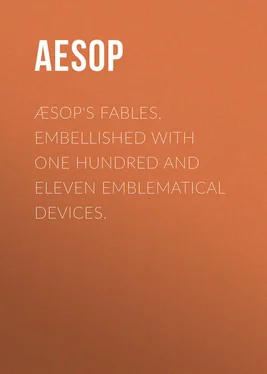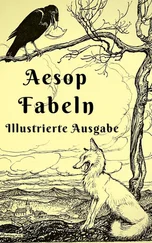Aesop - Æsop's Fables, Embellished with One Hundred and Eleven Emblematical Devices.
Здесь есть возможность читать онлайн «Aesop - Æsop's Fables, Embellished with One Hundred and Eleven Emblematical Devices.» — ознакомительный отрывок электронной книги совершенно бесплатно, а после прочтения отрывка купить полную версию. В некоторых случаях можно слушать аудио, скачать через торрент в формате fb2 и присутствует краткое содержание. ISBN: , Издательство: Иностранный паблик, Жанр: foreign_antique, foreign_prose, foreign_children, на английском языке. Описание произведения, (предисловие) а так же отзывы посетителей доступны на портале библиотеки ЛибКат.
- Название:Æsop's Fables, Embellished with One Hundred and Eleven Emblematical Devices.
- Автор:
- Издательство:Иностранный паблик
- Жанр:
- Год:неизвестен
- ISBN:http://www.gutenberg.org/ebooks/39187
- Рейтинг книги:5 / 5. Голосов: 1
-
Избранное:Добавить в избранное
- Отзывы:
-
Ваша оценка:
- 100
- 1
- 2
- 3
- 4
- 5
Æsop's Fables, Embellished with One Hundred and Eleven Emblematical Devices.: краткое содержание, описание и аннотация
Предлагаем к чтению аннотацию, описание, краткое содержание или предисловие (зависит от того, что написал сам автор книги «Æsop's Fables, Embellished with One Hundred and Eleven Emblematical Devices.»). Если вы не нашли необходимую информацию о книге — напишите в комментариях, мы постараемся отыскать её.
Æsop's Fables, Embellished with One Hundred and Eleven Emblematical Devices. — читать онлайн ознакомительный отрывок
Ниже представлен текст книги, разбитый по страницам. Система сохранения места последней прочитанной страницы, позволяет с удобством читать онлайн бесплатно книгу «Æsop's Fables, Embellished with One Hundred and Eleven Emblematical Devices.», без необходимости каждый раз заново искать на чём Вы остановились. Поставьте закладку, и сможете в любой момент перейти на страницу, на которой закончили чтение.
Интервал:
Закладка:
This is another lesson against injustice; a topic in which our just Author abounds. And, if we consider the matter fairly, we must allow it to be as reasonable that some one should do violence to us, as we should commit it upon another. When we are impartial in our reflections, thus we must always think. The unjust man, with a hardened unfeeling heart, can do a thousand bitter things to others: but if a single calamity touches himself, oh, how tender he is! How insupportable is the uneasiness it occasions! Why should we think others born to hard treatment more than ourselves? Or imagine it can be reasonable to do to another, what we ourselves should be unwilling to suffer? In our behaviour to all mankind, we need only ask ourselves these plain questions, and our consciences will tell us how to act. Conscience, like a good valuable domestic, plays the remembrancer to us upon all occasions, and gives us a gentle twitch, when we are going to do a wrong thing. It does not, like the adder in the fable, bite us to death, but only gives us kind cautions. However, if we neglect these just and frequent warnings, and continue in a course of wickedness and injustice, do not let us be surprised if Providence thinks fit, at last, to give us a home sting, and to exercise a little retaliation upon us.
FABLE XIII
A Sow had just farrowed, and lay in the stye, with her whole litter of pigs about her. A Wolf who longed for one of them, but knew not how to come at it, endeavoured to insinuate himself into the Sow's good opinion: and, accordingly, coming up to her – 'How does the good woman in the straw do?' says he. 'Can I be of any service to you, Mrs. Sow, in relation to your little family here? If you have a mind to go abroad, and air yourself a little, or so, you may depend upon it, I will take as much care of your pigs as you could yourself.' – 'Your humble servant,' says the Sow, 'I thoroughly understand your meaning; and, to let you know I do, I must be so free as to tell you, I had rather have your room than your company; and, therefore, if you would act like a Wolf of honour, and oblige me, I beg I may never see your face again.'
The being officiously good-natured and civil is something so uncommon in the world, that one cannot hear a man make profession of it without being surprised, or, at least, suspecting the disinterestedness of his intentions. Especially, when one who is a stranger to us, or though known, is ill-esteemed by us, will be making offers of services, we have great reason to look to ourselves, and exert a shyness and coldness towards him. We should resolve not to receive even favours from bad kind of people; for should it happen that some immediate mischief was not couched in them, yet it is dangerous to have obligations to such, or to give them an opportunity of making a communication with us.
FABLE XIV
The Horse, adorned with his great war-saddle, and champing his foaming bridle, came thundering along the way, and made the mountains echo with his loud shrill neighing. He had not gone far, before he overtook an Ass, who was labouring under a heavy burden, and moving slowly on in the same track with himself. Immediately he called out to him, in a haughty imperious tone, and threatened to trample him in the dirt, if he did not break the way for him. The poor patient Ass, not daring to dispute the matter, quietly got out of his way as fast as he could, and let him go by. Not long after this, the same Horse, in an engagement with the enemy, happened to be shot in the eye, which made him unfit for show, or any military business; so he was stripped of his fine ornaments, and sold to a carrier. The Ass, meeting him in this forlorn condition, thought that now it was his time to insult; and so, says he, 'Hey-day, friend, is it you? Well, I always believed that pride of yours would one day have a fall.'
Pride is a very unaccountable vice: many people fall into it unawares, and are often led into it by motives, which, if they considered things rightly, would make them abhor the very thoughts of it. There is no man that thinks well of himself, but desires that the rest of the world should think so too. Now it is the wrong measures we take in endeavouring after this, that expose us to discerning people in that light which they call pride, and which is so far from giving us any advantage in their esteem, that it renders us despicable and ridiculous. It is an affectation of appearing considerable, that puts men upon being proud and insolent; and their very being so makes them, infallibly, little, and inconsiderable. The man that claims and calls for reverence and respect, deserves none; he that asks for applause, is sure to lose it; the certain way to get it is to seem to shun it; and the humble man, according to the maxims even of this world, is the most likely to be exalted. He that, in his words or actions, pleads for superiority, and rather chooses to do an ill action, than condescend to do a good one, acts like the Horse, and is as void of reason and understanding. The rich and the powerful want nothing but the love and esteem of mankind to complete their felicity; and these they are sure to obtain by a good-humoured, kind condescension; and as certain of being every body's aversion, while the least tincture of overbearing rudeness is perceptible in their words or actions. What brutal tempers must they be of, who can be easy and indifferent, while they know themselves to be universally hated, though in the midst of affluence and power! But this is not all; for if ever the wheel of fortune should whirl them from the top to the bottom, instead of friendship or commiseration, they will meet with nothing but contempt; and that with much more justice than ever they themselves exerted it towards others.
FABLE XV
A Wolf meeting a Lamb, one day, in company with a Goat – 'Child,' says he, 'you are mistaken; this is none of your mother; she is yonder;' pointing to a flock of sheep at a distance. – 'It may be so,' says the Lamb; 'the person that happened to conceive me, and afterwards bore me a few months in her belly, because she could not help it, and then dropped me, she did not care where, and left me to the wide world, is, I suppose, what you call my mother; but I look upon this charitable Goat as such, that took compassion on me in my poor, helpless, destitute condition, and gave me suck; sparing it out of the mouths of her own kids, rather than I should want it.' – 'But sure,' says he, 'you have a greater regard for her that gave you life, than for any body else.' – 'She gave me life! I deny that. She that could not so much as tell whether I should be black or white, had a great hand in giving me life, to be sure! But, supposing it were so, I am mightily obliged to her, truly, for contriving to let me be of the male-kind, so that I go every day in danger of the butcher. What reason then have I to have a greater regard for one to whom I am so little indebted for any part of my being, than for those from whom I have received all the benevolence and kindness which have hitherto supported me in life?'
It is they whose goodness makes them our parents, that properly claim filial respect from us, and not those who are such only out of necessity. The duties between parents and their children are relative and reciprocal. By all laws, natural as well as civil, it is expected that the parents should cherish and provide for the child, till it is able to shift for itself; and that the child, with a mutual tenderness, should depend upon the parent for its sustenance, and yield it a reasonable obedience. Yet, through the depravity of human nature, we very often see these laws violated, and the relations before-mentioned treating one another with as much virulence as enemies of different countries are capable of. Through the natural impatience and protervity of youth, we observe the first occasion for any animosity most frequently arising from their side; but, however, there are not wanting examples of undutiful parents: and, when a father, by using a son ill, and denying him such an education and such an allowance as his circumstances can well afford, gives him occasion to withdraw his respect from him, to urge his begetting of him as the sole obligation to duty, is talking like a silly unthinking dotard. Mutual benevolence must be kept up between relations, as well as friends; for, without this cement, whatever you please to call the building, it is only a castle in the air, a thing to be talked of, without the least reality.
Читать дальшеИнтервал:
Закладка:
Похожие книги на «Æsop's Fables, Embellished with One Hundred and Eleven Emblematical Devices.»
Представляем Вашему вниманию похожие книги на «Æsop's Fables, Embellished with One Hundred and Eleven Emblematical Devices.» списком для выбора. Мы отобрали схожую по названию и смыслу литературу в надежде предоставить читателям больше вариантов отыскать новые, интересные, ещё непрочитанные произведения.
Обсуждение, отзывы о книге «Æsop's Fables, Embellished with One Hundred and Eleven Emblematical Devices.» и просто собственные мнения читателей. Оставьте ваши комментарии, напишите, что Вы думаете о произведении, его смысле или главных героях. Укажите что конкретно понравилось, а что нет, и почему Вы так считаете.












